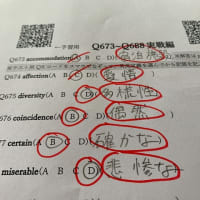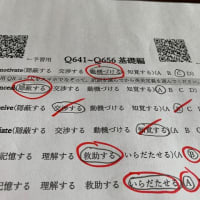著作権の切れた童話「ドリトル先生航海記」から、シンプルで、大学入試にもTOEICにも英検にも有効な練習問題を作成しています。コロンで区切られているのが四語選択問題、スラッシュで区切られているのが四語整序問題です。*印は難易度の目安で、*印が多いほど難しい単語になっています。無印は語法・文法等の問題です。楽しみながら英語力を伸ばしていただければ幸いです。
※(67)の解答①(if he knew what)②(wonder)③(weeping)④(can get cold anyway)⑤(thoroughly)⑥(he said turning to)⑦(this land are dead)⑧(pockets to see if)⑨(employ)⑩(fear)⑪(forced)⑫(dispatch)⑬(promptly)⑭(brought to our door)⑮(as though it were)⑯(curious)⑰(realized)⑱(grinding this stick into)⑲(that was smoking with)⑳(filled)
(68)
The Indians murmured and grunted with ①*(pollution : faith : courage : astonishment). At first they were all for ②(knees / falling / their / on) and worshiping the fire. Then they wanted to pick it up with their ③*(profound : fair : regular : bare) hands and play with it. We had to teach them how it was to be used; and they were quite fascinated when we laid our fish across it on sticks and cooked it. They sniffed the air with relish as, for the first time in history, the smell ④(passed / of / fish / fried) through the village of Popsipetel.
Then we ⑤(bring / to / them / got ) us piles and stacks of dry wood; and we made an enormous bonfire in the middle of the main street. Round this, when they felt its warmth, the whole tribe gathered and smiled and wondered. It was a striking sight, one of the pictures from our voyages that I most frequently remember: that roaring jolly blaze beneath the black night sky, and all about it a ⑥(of / vast / Indians / ring), the firelight gleaming on bronze cheeks, white teeth and flashing eyes—a whole town ⑦(get / trying / warm / to), giggling and pushing like school-children.
In a little, when we had got them more used to the ⑧*(resisting : handling : removing : expressing) of fire, the Doctor showed them how it could be ⑨(houses / taken / their / into) if a hole were only made in the roof to let the smoke out. And before we turned in after that long, long, tiring day, we had fires going in every hut in the village.
The poor people were so glad to get really warm again that we thought they'd never go to bed. Well on into the early hours of the morning the little town fairly buzzed with a great low murmur: the Popsipetels sitting up talking of their wonderful pale-faced visitor and this strange good thing he ⑩(brought / him / had / with)—FIRE!
THE FOURTH CHAPTER. WHAT MAKES AN ISLAND FLOAT
VERY early in our experience of Popsipetel kindness we saw that if we were to get anything done at all, we would almost always have to do it ⑪*(secretly : precisely : merely : actually). The Doctor was so popular and loved by all that as soon as he showed his face at his door in the morning crowds of admirers, waiting ⑫*(awfully : rapidly : finally : patiently) outside, flocked about him and followed him wherever he went. After his fire-making feat, this childlike people expected him, I think, to be continually doing magic; and they were ⑬(exploded : determined : wandered : pretended ) not to miss a trick.
It was only with great difficulty that we escaped from the crowd the first morning and set out with Long Arrow to ⑭**(seize : explore : violate : commute) the island at our leisure.
In the interior we ⑮(only / not / that / found ) the plants and trees were suffering from the cold: the animal life was in even worse straits. Everywhere shivering birds were to be seen, their feathers all fluffed out, ⑯(for / gathering / flight / together) to summer lands. And many lay dead upon the ground. Going down to the shore, we watched land-crabs in large numbers taking to the sea to find some better home. While away to the Southeast we could see many icebergs floating—a sign that we were now not far from the ⑰*(ideal : proper : previous : terrible) region of the Antarctic.
As we were ⑱(to / looking / sea / out), we noticed our friends the porpoises jumping through the waves. The Doctor hailed them and they came inshore.
He asked them how far we were from the South Polar Continent.
About a hundred miles, they told him. And then they asked why he wanted to know.
"Because this floating island we are on," said he, "is drifting southward all the time in a ⑲**(cheer : shortage : current : flame). It's an island that ordinarily belongs somewhere in the tropic zone—real sultry weather, sunstrokes and all that. If it doesn't stop going southward pretty soon everything on it is going to ⑳**(withstand : perish : abuse : embrace)."
解答は次回発表。ご意見、ご要望等はsuzuyasu@wmail.plala.or.jpでも承っております。
※(67)の解答①(if he knew what)②(wonder)③(weeping)④(can get cold anyway)⑤(thoroughly)⑥(he said turning to)⑦(this land are dead)⑧(pockets to see if)⑨(employ)⑩(fear)⑪(forced)⑫(dispatch)⑬(promptly)⑭(brought to our door)⑮(as though it were)⑯(curious)⑰(realized)⑱(grinding this stick into)⑲(that was smoking with)⑳(filled)
(68)
The Indians murmured and grunted with ①*(pollution : faith : courage : astonishment). At first they were all for ②(knees / falling / their / on) and worshiping the fire. Then they wanted to pick it up with their ③*(profound : fair : regular : bare) hands and play with it. We had to teach them how it was to be used; and they were quite fascinated when we laid our fish across it on sticks and cooked it. They sniffed the air with relish as, for the first time in history, the smell ④(passed / of / fish / fried) through the village of Popsipetel.
Then we ⑤(bring / to / them / got ) us piles and stacks of dry wood; and we made an enormous bonfire in the middle of the main street. Round this, when they felt its warmth, the whole tribe gathered and smiled and wondered. It was a striking sight, one of the pictures from our voyages that I most frequently remember: that roaring jolly blaze beneath the black night sky, and all about it a ⑥(of / vast / Indians / ring), the firelight gleaming on bronze cheeks, white teeth and flashing eyes—a whole town ⑦(get / trying / warm / to), giggling and pushing like school-children.
In a little, when we had got them more used to the ⑧*(resisting : handling : removing : expressing) of fire, the Doctor showed them how it could be ⑨(houses / taken / their / into) if a hole were only made in the roof to let the smoke out. And before we turned in after that long, long, tiring day, we had fires going in every hut in the village.
The poor people were so glad to get really warm again that we thought they'd never go to bed. Well on into the early hours of the morning the little town fairly buzzed with a great low murmur: the Popsipetels sitting up talking of their wonderful pale-faced visitor and this strange good thing he ⑩(brought / him / had / with)—FIRE!
THE FOURTH CHAPTER. WHAT MAKES AN ISLAND FLOAT
VERY early in our experience of Popsipetel kindness we saw that if we were to get anything done at all, we would almost always have to do it ⑪*(secretly : precisely : merely : actually). The Doctor was so popular and loved by all that as soon as he showed his face at his door in the morning crowds of admirers, waiting ⑫*(awfully : rapidly : finally : patiently) outside, flocked about him and followed him wherever he went. After his fire-making feat, this childlike people expected him, I think, to be continually doing magic; and they were ⑬(exploded : determined : wandered : pretended ) not to miss a trick.
It was only with great difficulty that we escaped from the crowd the first morning and set out with Long Arrow to ⑭**(seize : explore : violate : commute) the island at our leisure.
In the interior we ⑮(only / not / that / found ) the plants and trees were suffering from the cold: the animal life was in even worse straits. Everywhere shivering birds were to be seen, their feathers all fluffed out, ⑯(for / gathering / flight / together) to summer lands. And many lay dead upon the ground. Going down to the shore, we watched land-crabs in large numbers taking to the sea to find some better home. While away to the Southeast we could see many icebergs floating—a sign that we were now not far from the ⑰*(ideal : proper : previous : terrible) region of the Antarctic.
As we were ⑱(to / looking / sea / out), we noticed our friends the porpoises jumping through the waves. The Doctor hailed them and they came inshore.
He asked them how far we were from the South Polar Continent.
About a hundred miles, they told him. And then they asked why he wanted to know.
"Because this floating island we are on," said he, "is drifting southward all the time in a ⑲**(cheer : shortage : current : flame). It's an island that ordinarily belongs somewhere in the tropic zone—real sultry weather, sunstrokes and all that. If it doesn't stop going southward pretty soon everything on it is going to ⑳**(withstand : perish : abuse : embrace)."
解答は次回発表。ご意見、ご要望等はsuzuyasu@wmail.plala.or.jpでも承っております。






















※コメント投稿者のブログIDはブログ作成者のみに通知されます